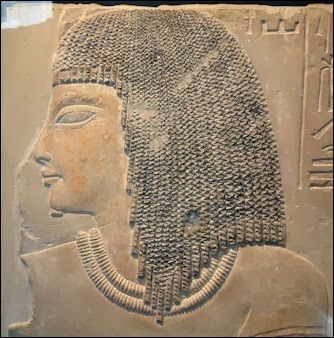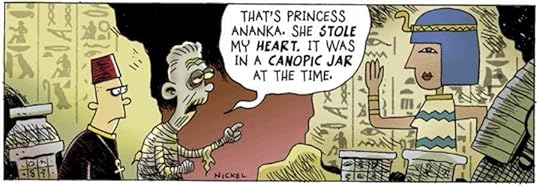Vicky Alvear Shecter's Blog, page 11
April 24, 2014
Excerpt from ANUBIS SPEAKS! A GUIDE TO THE AFTERLIFE BY THE EGYPTIAN GOD OF THE DEAD
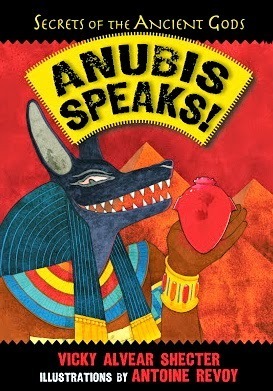
About the book: Anubis, the god of mummification, takes the reader on a boat journey through the mythological ancient Egyptian dark lands—the twelve hours of darkness—where Ra battles against the forces of chaos to be reborn again at sunrise. Like a good tour guide, Anubis shares fascinating facts and stories about ancient Egypt throughout the trip.
School Library Journal says Anubis's narration is "wickedly funny" and that the book is "stuffed with an "incredible wealth of interesting detail. Kirkus says it is an "informative and unusually lively look at the Egyptian way of death."
A Cybil's Award Finalistfor Midgrade Non Fiction
Greetings Mortal!
Allow me to introduce myself. I am Anubis—the Egyptian god of the “Mysteries of Embalming,” the “Guardian of the Veil of Death,” “Opener of the Ways of the Dead,” and if you are “bad” . . . Your. Worst. Nightmare.But do not fear. I will not snatch your beating heart from your chest and toss it to my good friend, crocodile-headed Amut the Destroyer for a squishy snack . . . not today anyway. Instead, I will guide you through my world of deep magic, strange gods, and gruesome monsters. I will show you how my people, the ancient Egyptians, prepared the dead for eternal life, and how we gods fought the forces of darkness and evil—every night—to keep you safe. Oh dear, were you perhaps hoping for a less scary- looking guide to lead you through the Egyptian dark lands; one without so many razor-sharp fangs? Too bad. You’re in my realm now. And I’m in charge. So pay attention. We will, soon enough, come face-to-face with the evil one—Apophis, the snake of doom that threatens to devour and destroy the world. In my day, only our dead pharaohs—kings who turned into immortal gods upon their deaths—were strong enough to join the rest of us gods in facing the beast. You, my little human, are no pharaoh, but I’m allowing you to come along anyway. You may thank me later, preferably in buckets of blood. Meanwhile, take heed; if you scare easily, I suggest you close this book right now and go back to coloring rainbows and unicorns. Seriously. There will be blood. And snakes. And decapitations. And monsters who like to gobble up hearts and squeeze heads until they pop. Still with us? Good. Then, please, step into my lair…
…Egypt’s First Pharaoh
My dad, Osiris, was an important guy, if I do say so myself. My people believed that he was Egypt’s first pharaoh. He brought farming to the land and showed humans how to live like people and not animals. He achieved many great things, me being one of them, of course. Osiris ruled happily in Egypt while I was in charge of the underworld. All of it. Then the jealous god Set murdered his own brother Osiris. After lots of drama—including the cutting up and hiding of Osiris’s body parts—his wife, Isis, came to me for help in re- assembling Osiris’s body, which I did through the magic of mummification. Then we brought the old man back to life. The catch was he could only live in the land of the dead. (Hey, you can’t have everything, am I right?) Still, let the record show that I, Anubis, revived and resurrected my own father. And how did dear old dad thank me for resurrecting him? He demoted me. Yeah, Dad took my job. He became the top god of the dead, pushing me down to number two—as mere god of judgment and embalming. Now, I ask you, is that fair? I mean without me, he’d still be in pieces! But I’m not bitter. Really, I’m not. Anyway, thanks to my magnificent mummification and resurrecting abilities, Osiris became the model mummy, the symbol of what everyone hoped for themselves in the afterlife— to be preserved in their earthly form and live forever. So despite the fact that he took my job, most of the prayers for the dead are aimed at me, because I’m the guy who made it all happen. Just sayin’.
I Want My Mummy!
With Osiris as their example, my people believed you needed your body to join the party that never ended: no body, no afterlife. Of course, in a pinch, your statue might do, but for the most part, people preferred a future in their own skins . . . literally. So how did it all begin? When the earliest Egyptians buried their dead in the desert, the intense heat dried out the corpses, mummifying them in a crude way. My people noticed the dried-out bodies and figured that’s what we gods wanted for them. Some bodies, though, were ripped apart by wild animals before they dried out. Nobody wanted that. So they put the dead bodies in coffins to protect them from wildlife. But without direct contact with the desert sand to bake them dry, the bodies melted into goo. That’s when people began experimenting with different preservation techniques. Eventually, they found the best process for preserving the dead, which I will explain below…
Coming in 2014:Hades Speaks! A Guide to theUnderworld by the Greek God of the Dead
Purchase Anubis Speaks!IndieBound AmazonB&N
Published on April 24, 2014 18:27
April 23, 2014
Excerpts from Curses and Smoke: A Novel of Pompeii
 About the Book: Vetted by Roman experts and a Latin teacher, the novel tells the story of two teens in alternating voices: Lucia, the daughter of the owner of a struggling gladiatorial school, and Tages, a medical slave in her father’s school. Concerned by strange signs in the natural world around her, Lucia dreams about discussing them with the naturalist Pliny, who lives across the bay. Tag dreams of training to fight in the arena to earn his freedom. Their lives intertwine under the shadow of an old curse tablet and the ominous rumblings of Vesuvius.
About the Book: Vetted by Roman experts and a Latin teacher, the novel tells the story of two teens in alternating voices: Lucia, the daughter of the owner of a struggling gladiatorial school, and Tages, a medical slave in her father’s school. Concerned by strange signs in the natural world around her, Lucia dreams about discussing them with the naturalist Pliny, who lives across the bay. Tag dreams of training to fight in the arena to earn his freedom. Their lives intertwine under the shadow of an old curse tablet and the ominous rumblings of Vesuvius.
Edited by Cheryl Klein and published by Arthur A. Levine Books/ScholasticMay 2014
Tag
 …The morning’s warm-up consisted of running an obstacle course with wooden shield and sword in hand. When it was Tag’s turn, he sprinted for the barrels — three large ones — and leapt over them, landing on his feet in a crouch. Making sure his equipment never touched the ground, he weaved in and out of the low ropes tied between posts. Next, he dodged a line of sandbags sent swinging in different rhythms, and finally, still on the run, he struck a swinging straw man on its chest. A dishonorable hit to the back would have meant three sprinting laps around the courtyard.Tag bent over his knees, gasping for air, then got back in line for the next go-round. He looked up when he heard a strange popping sound. A heavily muscled man dropped to the ground behind the barrels, grabbing the back of his thigh, bellowing in pain.Tag winced. That popping sound meant only one thing — the man had torn a major muscle in two. He ran out to the fighter and could already see the bulge forming where the muscle separated. He cursed under his breath.The man’s red, sweating face was contorted in agony. “You two!” Tag pointed at two fighters staring at their downed friend. “Lift him and take him to the treatment room. Statim!”Tag jogged ahead of them. “Cool clay from near the cistern,” he called to a wide-eyed slave standing by. “Two buckets’ worth. Now.” The young man took off. When Tag applied the cool clay to the man’s back thigh, some of the fighter’s curses eased. He reached for a poppy tincture to relax the man, mostly because he wanted him to be still. The worst thing the fighter could do now was to continue moving that muscle, and getting a gladiator to stop moving — no matter the pain — was no easy task. When the man’s breathing eased, Tag headed to the herbal room for additional supplies, Castor trailing on his heels. Inside, he took a deep breath and thought about his next steps. He would reapply the clay, maybe adding crushed mint to the mix. Then he’d wrap the leg tight, holding the muscle together so that it could reattach and heal. Perhaps calendula paste applied before bandaging would — “Lady Lucia,” Castor cried, running over to her as she stood in the doorway. Tag’s heart jumped. Lucia never came into the medical rooms because it meant walking among the gladiators, which her father strictly forbade. “Are you ill or hurt?” he asked. “No,” she said. “Look, Domina,” Castor said before she could say anything else. He pointed at a row of terra-cotta containers. "I marked the medicine jars." She touched the top of one wax-sealed jar. “How do you know which one contains what medicine?” Castor traced a grimy finger over the Greek letters scratched onto the surface of each jar. “I can read letters now! If this letter is the first one,” he said, indicating the alpha, “then it means A, for apple tree bark. And if that letter is tau, it means T for toadflax.” “That is impressive, Castor!” she said, looking up at Tag through her lashes. Her gaze lingered for a moment before she smiled down on the boy, and Tag felt the weight of it like a physical caress. He cleared his throat. “Castor, I need you to go and check on the injured gladiator. I want you to make sure he hasn’t moved.”Castor stuck his lower lip out and crossed his arms. “I don’t want to go. I want to show Domina all that I’ve been learning.” Tag raised an eyebrow. “Are you going to misbehave in front of Domina?” he asked in an overly surprised voice. He knew that was a low blow — Castor adored Lucia. The boy’s face grew blotchy. “Go,” Lucia said gently to the boy. “After you have finished your healing work, bring a wax tablet to the atrium and show me then.” Castor nodded, gave her a shy grin, and raced out of the room. Then Lucia’s eyes met Tag’s, and they stared at each other in silence. It was all he could do not to rush over and press her against him.One of the gladiators walked by the door, and she quickly spoke. “My nurse has been feeling poorly, and I wondered if you could recommend a tonic.” Tag struggled to remember the proper response. “Uh . . . Tell me her symptoms.” “Metrodona is fine,” she said in a low voice, coming closer when the gladiator had passed. “I just wanted to talk to you.” Gods, how he loved her warm, clean scent — like blooming citron trees drenched in sunshine. He would not look at her mouth. Or the silk of her neck. He needed to keep his head. “What did you want to talk about?” She twisted her fingers together. “I miss you. I wanted to see you.” “Your ankle is well enough to go out into the woods?” She nodded. “But you are usually training in the afternoons.” As the sound of footsteps approached in the hall, he said loudly, “Perhaps this salve for tight muscles may ease your nurse’s backache.” “Thank you, healer,” she responded in the same overly loud tone as the footsteps disappeared. She walked over to the shrine of Asclepius and he moved beside her. Standing close with their heads bowed in front of the shrine was the only way such proximity would be allowed. Tag let his arm brush hers, and even at that small touch, his heart raced. “I can come this afternoon,” he whispered, glad that Quintus’s sudden absence gave him the freedom to sneak away. She smiled. “Good.” “In the future, I’ll send Castor with a message when I think I can get away.” “You can’t — then he will know.” “It will be in code.” She released a breath. “What will the code be?” “How about, ‘The medicusis out on an errand,’” he said. She looked at him disbelievingly. “That’s a terrible code. It’s too obvious.” He grinned, embarrassed. “All right. You come up with one.” “Send Castor with some salve for Metrodona’s back. When he delivers it unexpectedly, I’ll know you will be free and heading for the woods.” “All right. But how will you get free of Metrodona?” “I’ll figure out a way.” He smiled. She placed her fingertips on a clay foot votive. “Is this for the stable boy? How is he recovering?”On an impulse, he ran his finger lightly over hers, tracing slowly down and around the curve of her thumb. It made no sense that such an innocent touch could cause him to nearly vibrate with desire for her, but it seemed to have the same effect on her, judging by the way her breath hitched. They both stared at their hands in silence as he continued stroking her skin.“I will . . . I will find a way to get out there today,” he promised.She shivered and pulled her hand away. “This afternoon, then,” she said in a shaky whisper and rushed out of the room.
…The morning’s warm-up consisted of running an obstacle course with wooden shield and sword in hand. When it was Tag’s turn, he sprinted for the barrels — three large ones — and leapt over them, landing on his feet in a crouch. Making sure his equipment never touched the ground, he weaved in and out of the low ropes tied between posts. Next, he dodged a line of sandbags sent swinging in different rhythms, and finally, still on the run, he struck a swinging straw man on its chest. A dishonorable hit to the back would have meant three sprinting laps around the courtyard.Tag bent over his knees, gasping for air, then got back in line for the next go-round. He looked up when he heard a strange popping sound. A heavily muscled man dropped to the ground behind the barrels, grabbing the back of his thigh, bellowing in pain.Tag winced. That popping sound meant only one thing — the man had torn a major muscle in two. He ran out to the fighter and could already see the bulge forming where the muscle separated. He cursed under his breath.The man’s red, sweating face was contorted in agony. “You two!” Tag pointed at two fighters staring at their downed friend. “Lift him and take him to the treatment room. Statim!”Tag jogged ahead of them. “Cool clay from near the cistern,” he called to a wide-eyed slave standing by. “Two buckets’ worth. Now.” The young man took off. When Tag applied the cool clay to the man’s back thigh, some of the fighter’s curses eased. He reached for a poppy tincture to relax the man, mostly because he wanted him to be still. The worst thing the fighter could do now was to continue moving that muscle, and getting a gladiator to stop moving — no matter the pain — was no easy task. When the man’s breathing eased, Tag headed to the herbal room for additional supplies, Castor trailing on his heels. Inside, he took a deep breath and thought about his next steps. He would reapply the clay, maybe adding crushed mint to the mix. Then he’d wrap the leg tight, holding the muscle together so that it could reattach and heal. Perhaps calendula paste applied before bandaging would — “Lady Lucia,” Castor cried, running over to her as she stood in the doorway. Tag’s heart jumped. Lucia never came into the medical rooms because it meant walking among the gladiators, which her father strictly forbade. “Are you ill or hurt?” he asked. “No,” she said. “Look, Domina,” Castor said before she could say anything else. He pointed at a row of terra-cotta containers. "I marked the medicine jars." She touched the top of one wax-sealed jar. “How do you know which one contains what medicine?” Castor traced a grimy finger over the Greek letters scratched onto the surface of each jar. “I can read letters now! If this letter is the first one,” he said, indicating the alpha, “then it means A, for apple tree bark. And if that letter is tau, it means T for toadflax.” “That is impressive, Castor!” she said, looking up at Tag through her lashes. Her gaze lingered for a moment before she smiled down on the boy, and Tag felt the weight of it like a physical caress. He cleared his throat. “Castor, I need you to go and check on the injured gladiator. I want you to make sure he hasn’t moved.”Castor stuck his lower lip out and crossed his arms. “I don’t want to go. I want to show Domina all that I’ve been learning.” Tag raised an eyebrow. “Are you going to misbehave in front of Domina?” he asked in an overly surprised voice. He knew that was a low blow — Castor adored Lucia. The boy’s face grew blotchy. “Go,” Lucia said gently to the boy. “After you have finished your healing work, bring a wax tablet to the atrium and show me then.” Castor nodded, gave her a shy grin, and raced out of the room. Then Lucia’s eyes met Tag’s, and they stared at each other in silence. It was all he could do not to rush over and press her against him.One of the gladiators walked by the door, and she quickly spoke. “My nurse has been feeling poorly, and I wondered if you could recommend a tonic.” Tag struggled to remember the proper response. “Uh . . . Tell me her symptoms.” “Metrodona is fine,” she said in a low voice, coming closer when the gladiator had passed. “I just wanted to talk to you.” Gods, how he loved her warm, clean scent — like blooming citron trees drenched in sunshine. He would not look at her mouth. Or the silk of her neck. He needed to keep his head. “What did you want to talk about?” She twisted her fingers together. “I miss you. I wanted to see you.” “Your ankle is well enough to go out into the woods?” She nodded. “But you are usually training in the afternoons.” As the sound of footsteps approached in the hall, he said loudly, “Perhaps this salve for tight muscles may ease your nurse’s backache.” “Thank you, healer,” she responded in the same overly loud tone as the footsteps disappeared. She walked over to the shrine of Asclepius and he moved beside her. Standing close with their heads bowed in front of the shrine was the only way such proximity would be allowed. Tag let his arm brush hers, and even at that small touch, his heart raced. “I can come this afternoon,” he whispered, glad that Quintus’s sudden absence gave him the freedom to sneak away. She smiled. “Good.” “In the future, I’ll send Castor with a message when I think I can get away.” “You can’t — then he will know.” “It will be in code.” She released a breath. “What will the code be?” “How about, ‘The medicusis out on an errand,’” he said. She looked at him disbelievingly. “That’s a terrible code. It’s too obvious.” He grinned, embarrassed. “All right. You come up with one.” “Send Castor with some salve for Metrodona’s back. When he delivers it unexpectedly, I’ll know you will be free and heading for the woods.” “All right. But how will you get free of Metrodona?” “I’ll figure out a way.” He smiled. She placed her fingertips on a clay foot votive. “Is this for the stable boy? How is he recovering?”On an impulse, he ran his finger lightly over hers, tracing slowly down and around the curve of her thumb. It made no sense that such an innocent touch could cause him to nearly vibrate with desire for her, but it seemed to have the same effect on her, judging by the way her breath hitched. They both stared at their hands in silence as he continued stroking her skin.“I will . . . I will find a way to get out there today,” he promised.She shivered and pulled her hand away. “This afternoon, then,” she said in a shaky whisper and rushed out of the room.By the time Tag bound the hurt gladiator’s leg and got him to his barrack room to rest, the morning training had ended. Tag stared at the sun over the trees, calculating how much time needed to pass before he could head out to the woods to see Lucia. Either way, it couldn’t come soon enough.“Healer! Pontius wants to see you,” one of the men called, startling him. “He is in the weapons room.”Whatever it was the overseer wanted, Tag hoped it wasn’t something that would take up the afternoon. He needed to see Lucia. He entered the weapons chamber, momentarily blinded by the shift from the bright courtyard to the dark and dusty room. As his vision adjusted, he spotted the shelves crowded with gladiator helmets. When he blinked, he had the uneasy sense that all of the bronze heads — as one — had turned to look at him with silent menace. "Who's there?” Pontius called from the corner.“It’s me, Tag.” “How is Brutus?” the overseer asked as he inspected the dings on an old shield. “Severe tear of the major back thigh muscle.” Pontius growled irritably. “What is going on lately? Our injury rate is ridiculous. The latest rumor is that Spartacus himself has returned to the mountain and is punishing Pompeii.” “What?” Tag laughed. “His ghost, anyway,” Pontius said. “And that his fury at not being avenged is causing the mountain to shake.” Tag shook his head. “That makes no sense. Spartacus and his men died in the fields of Lucania, not here!” Pontius waggled his eyebrows. “Yesssss, but they never found his body, so some of the men believe he came back to Vesuvius to die.” He rolled his eyes. Every slave knew that Spartacus and his army of slaves — many of them from Pompeii and the Campanian region — had defeated at least two Roman legions from their Vesuvian stronghold. “Everybody’s uneasy. Haven’t you noticed all the overwhelming offerings to Hercules lately?” continued Pontius. Tag had noticed — the niched shrine on the main barracks wall overflowed with flowers, fruits, small statuettes, coins, and other gifts to the muscular son of Zeus. “The master has heard some of the talk,” continued Pontius. “He wants me to shackle all of the gladiators at night so they don’t get any ideas about running away and joining Spartacus’s ghost.” Tag swallowed. “Is . . . is the master increasing the number of guards around the compound, then?” he asked. Gods. “No, costs too much,” Pontius said, picking up an angled Thracian sword. He cut his eyes at Tag. “Any particular reason that’s a concern, boy?” “No, no. Not at all.” “Because it never ends well when a slave tries to run away.” “I am aware.” “Ye might even say new fighters have a greater chance of winning their freedom in the arena than slaves have surviving a run,” he continued, inspecting the tip of the sword with one eye. “Which is to say, barely any chance at all.” “I know,” Tag said. Pontius put the blade down and grinned at him. “Good.” He slammed the trunk lid, clasped Tag by the shoulder, and ushered him out of the room. “Now, take me to Brutus and let’s talk to him together about what he’s gotta do to heal that bum leg.” ...
Lucia
 ...They set off, ambling in the shade of the multistoried insulaethat towered over the well-worn stone road. Lucia slowed her pace in time with her nurse’s sluggish, rolling gait. “You know, you could have bought your freedom ten times over if you hadn’t spent so much on these charlatan fortune-tellers like the Egyptian,” Lucia said. “Bah, what would I do with freedom?” Metrodona huffed.. “I am too old to start taking care of myself. Besides, who will watch your babies except for me — me, who wiped your bottom from the day you came into the world screaming?” “I’m not having babies any time soon,” Lucia snapped. Metrodona cackled. “You will be married soon. If you are as fertile as your mama, you will be knee-deep in ’em before you know it.” Lucia didn’t want to be as fertile as her mother, not if it meant her babies died at birth or in her womb. She took her nurse’s arm to help her navigate the large stones that got them across the street without having to step into the excess water from overflowing fountains .. When Lucia realized she’d gotten too far ahead of Metrodona, she slowed again and began idly reading the graffiti scratched onto insulae walls. ‘Secundus defecated here,’” she read, wrinkling her nose and checking the bottom of her shoes. Gods. Most were just as crude but one stopped her cold: “Learn this: while I am alive, you, hateful death, are coming.” She shook off a shiver. Why would someone scratch such a morose thought on a street wall? Scanning for something more uplifting, she lighted on “Figulus loves Idaia.” Much better.The market announced itself with a cacophony of noises — coppersmiths hammering on gleaming pots, leather workers punching holes into harnesses with iron mallets, wine sellers hawking their latest vintage, butchers extolling the sweetness of their ewe meat. They walked past a poultry farmer hawking the newest craze — parrots strung up by their strange little feet, looking like bunches of feathered fruit. “Only for the best banquets in Pompeii!" he called out. Behind the man with the parrots, a boy yelped as his teaching master caned him in front of the other students attending the open-air school. They found Metrodona’s Egyptian sitting on a low wooden stool in the shade of the colonnade near the flower stalls. Lucia leaned against a dusty red column as she examined the old man, who had leathery skin scored by the sun into deep ravines around his mouth and forehead, under a turbaned head. The man held out a dirty palm and Metrodona slipped some coins into it. In a blink, the coins were gone and the man turned to stare at Lucia. Metrodona waved her closer. “What am I supposed to do?” Lucia asked through the side of her mouth, afraid to look away from the old man’s strangely piercing stare. “Nothing,” Metrodona said. “He is reading you.” The man signaled, and Metrodona grabbed Lucia’s right hand and held the palm out for him to inspect. His brow furrowed and Lucia fought the impulse to snatch her hand away. But then he grinned, showing three brown teeth hanging from inflamed gums like tiny figs about to drop from their branch. He began chattering with Metrodona in heavily accented Latin. Lucia caught the words “love” and “a great passion” and decided she’d heard enough. The very idea of “passion” with her doddering betrothed made her shiver. “I’m going to go look at the incense,” she said, bending toward Metrodona’s ear. Her nurse nodded and waved her away as she continued her lively conversation with the old Egyptian. Dozens of terra-cotta bowls filled with tiny hills of brightly colored powders — yellow, red, blue, brown, purple — crowded the incense seller’s cart. Garlands of myrtle and rosemary hung from wooden beams, mixing with the sweet and tangy smells of so many different powders. “Ah, I have something special for a pretty young girl like you,” said a fat old woman with wiry gray hair She drew out a small leather pouch and opened it, stroking the worn brown leather as if it were a lover’s face. “Venus the goddess of love favors my special mix of rose and narcissus,” she said in a low tone, as if sharing a secret. “It will draw the true love of the one you seek.” “I need . . . do you have something for . . . making sure a marriage doesn’t happen?” Lucia asked.“Hmmmmm. Sometimes the goddess of love is insulted by unions that should not be so. To attract her attention to it, use powder of lilies in her sacred fire.” The woman quickly drew out another pouch. “These have been dried under moonlight. The goddess will notice this special blend and grant you your wish. I am certain of it.”“How much?” Lucia asked, and the haggling began. When they finally settled, the woman handed Lucia her portion wrapped in a carefully folded piece of old papyrus. “Purchasing something special?” a familiar voice asked from behind her. She turned, her heart skipping a beat. “Tag! What are you doing here?” He held up several small cloth bags pungent with the smells of earth and dried bitter herbs. “Pontius made me come today to pick up some things for him,” he said. “And I needed to refill some of our herb stores.” “Metrodona insisted I come today too. Funny, isn’t it?” He nodded, his eyes crinkling. “Healer! Healer!” came a high little voice. Castor ran up to Tag and pulled on his tunic. “Can we go see the monkey now, pleeeeease?” “You’re here too?” Lucia asked the boy, laughing.“I go where the healer goes, because I am going to be a healer when I grow up,” he said.“Wait,” Tag said, pretending confusion. “I thought you said you were going to be a gladiator.”The boy scowled up at him. “I am going to be both!” He turned to Lucia. “I am the healer’s appistant.” “A-what?”“Assistant. I am helping with everything.”“Helping create a mess, more like it,” Tag said. Something about the way he ruffled the slave boy’s hair made her heart contract. “The monkey! Please can we see the monkey now?” Castor begged.“I want to see it too,” Lucia said, following as the boy pulled Tag to the small gray-and-black monkey leashed to the fruit and nut seller’s stall. Castor dropped to his haunches before the creature, grinning from ear to ear. “Little monkey, meet little monkey,” Tag said, looking down at the boy. “You know, Castor, the resemblance between you two is downright troubling.” But the boy didn’t hear the teasing, so entranced was he by the small creature that looked into his eyes with a defeated, soulful gaze. “I let you feed the monkey if you buy from me,” the seller said.Castor shot up and bounced on his bare toes. “Oh, please please please please buy something! I want to feed him!”“Let us see,” Tag said, then turned to the grocer. “Show me your best Persian walnuts.”After Tag purchased a wrapped bundle of nuts and Castor had excitedly handed the monkey his treat — a piece of cucumber, which the creature took with tiny, delicate hands — they walked slowly away. Lucia asked, “Walnuts? Doesn’t the cook buy those?”“Yes. But these are not to eat — they are medicinal.”She looked up questioningly at him.“They are for my father,” he explained. “I have read that ground walnut powder mixed with bone-ash may help with his mental confusion. That and the occasional bleeding should help I hope.” He paused. “Which reminds me, my supply of leeches is getting low.”“Ugh. I’d rather be cut and bled than have leeches used on me.”“I will remember that.”They promenaded around the market, occasionally stealing glances at each other as they chatted about the household. Sometimes they bumped shoulders or brushed arms. Lucia felt as if all her awareness and sensation was gravitating toward Tag like iron to a magnet rock. She wondered how the weight of it didn’t make her tip over into him. Why was she reacting this way? This was Tag.“Well, do you?”His question startled her. She blinked. “Do I what?”“Want some bread? I’m hungry.”“Oh, sure.” She hadn’t even noticed that they’d stopped in front of a baker’s cart. They exchanged a few coins with the baker and ripped into the crusty, scored round loaf with relish. Castor stuffed so much into his mouth at once it looked like he’d shoved a trigon ball in his cheek. After finishing his bread, Castor ran toward a clutch of dirty, ragged chickens pecking at seeds near the vegetable carts. A great squawking of outrage ensued, and not just from the chickens. The sellers cursed at the boy to go away. “Gods, he never slows down,” muttered Tag. “It is very sweet that you have taken him under your wing,” Lucia said.“He is a smart boy,” he said. “What a waste it would be if no one ever bothered to train his mind.”His eyes were the color of dark, rich honey. She looked away quickly, her cheeks warming. “Yes, of course.”“In fact,” he continued, “he seems to pick up Greek naturally. Much faster than you ever did.”She stopped in her tracks. “That is not true! I learned it so fast, Father didn’t even know I was joining you in your lessons.” “I am teasing, Lucia,” he said, smiling down at her.“Oh. Right.” His smile was devastating. Apparently, she wasn’t the only one who found it so. Some of the other young women in the market were looking at Tag the same way she was — and some of the men too. Yet the moment someone attempted to talk to him — even if just to ask which baker had the best bread that day — his scowl returned. The expression was his shield, she realized, and it pained her to think how much he needed one. Castor bounced through the forum and toward the Temple of Venus. They slowly followed.“So, how fares Quintus?” he asked. “Or maybe I should ask, ‘How much sympathy has he been milking for his nose?’”She chuckled. “Half the time, I can’t tell whether it’s all an act or if he really is as insufferable as he comes across. Do you know how he introduced himself to me the first time I met him? He said, ‘My father owns the largest villa in Herculaneum.’ I wanted to say, ‘How nice for you — my father owns the smelliest gladiators in Pompeii.’ Really, it’s a wonder to me that no gladiator has pummeled him to death yet.”“Give it time,” he said.They walked in silence, dodging the people moving to and from Venus’s temple and altar. Wooden scaffolds climbed up the sides of the temple as builders scraped and pounded the walls that seemed always under some sort of renovation. As they neared the outdoor altar, Lucia pulled out her powder of lilies. “Excuse me a moment,” she said to Tag without looking at him. She sprinkled the fragrant powder over the dancing orange flames. The powder made a crackling sound, releasing a burst of sweetness mixed with apple-wood smoke. Closing her eyes, she murmured her prayer to the goddess of love:
...They set off, ambling in the shade of the multistoried insulaethat towered over the well-worn stone road. Lucia slowed her pace in time with her nurse’s sluggish, rolling gait. “You know, you could have bought your freedom ten times over if you hadn’t spent so much on these charlatan fortune-tellers like the Egyptian,” Lucia said. “Bah, what would I do with freedom?” Metrodona huffed.. “I am too old to start taking care of myself. Besides, who will watch your babies except for me — me, who wiped your bottom from the day you came into the world screaming?” “I’m not having babies any time soon,” Lucia snapped. Metrodona cackled. “You will be married soon. If you are as fertile as your mama, you will be knee-deep in ’em before you know it.” Lucia didn’t want to be as fertile as her mother, not if it meant her babies died at birth or in her womb. She took her nurse’s arm to help her navigate the large stones that got them across the street without having to step into the excess water from overflowing fountains .. When Lucia realized she’d gotten too far ahead of Metrodona, she slowed again and began idly reading the graffiti scratched onto insulae walls. ‘Secundus defecated here,’” she read, wrinkling her nose and checking the bottom of her shoes. Gods. Most were just as crude but one stopped her cold: “Learn this: while I am alive, you, hateful death, are coming.” She shook off a shiver. Why would someone scratch such a morose thought on a street wall? Scanning for something more uplifting, she lighted on “Figulus loves Idaia.” Much better.The market announced itself with a cacophony of noises — coppersmiths hammering on gleaming pots, leather workers punching holes into harnesses with iron mallets, wine sellers hawking their latest vintage, butchers extolling the sweetness of their ewe meat. They walked past a poultry farmer hawking the newest craze — parrots strung up by their strange little feet, looking like bunches of feathered fruit. “Only for the best banquets in Pompeii!" he called out. Behind the man with the parrots, a boy yelped as his teaching master caned him in front of the other students attending the open-air school. They found Metrodona’s Egyptian sitting on a low wooden stool in the shade of the colonnade near the flower stalls. Lucia leaned against a dusty red column as she examined the old man, who had leathery skin scored by the sun into deep ravines around his mouth and forehead, under a turbaned head. The man held out a dirty palm and Metrodona slipped some coins into it. In a blink, the coins were gone and the man turned to stare at Lucia. Metrodona waved her closer. “What am I supposed to do?” Lucia asked through the side of her mouth, afraid to look away from the old man’s strangely piercing stare. “Nothing,” Metrodona said. “He is reading you.” The man signaled, and Metrodona grabbed Lucia’s right hand and held the palm out for him to inspect. His brow furrowed and Lucia fought the impulse to snatch her hand away. But then he grinned, showing three brown teeth hanging from inflamed gums like tiny figs about to drop from their branch. He began chattering with Metrodona in heavily accented Latin. Lucia caught the words “love” and “a great passion” and decided she’d heard enough. The very idea of “passion” with her doddering betrothed made her shiver. “I’m going to go look at the incense,” she said, bending toward Metrodona’s ear. Her nurse nodded and waved her away as she continued her lively conversation with the old Egyptian. Dozens of terra-cotta bowls filled with tiny hills of brightly colored powders — yellow, red, blue, brown, purple — crowded the incense seller’s cart. Garlands of myrtle and rosemary hung from wooden beams, mixing with the sweet and tangy smells of so many different powders. “Ah, I have something special for a pretty young girl like you,” said a fat old woman with wiry gray hair She drew out a small leather pouch and opened it, stroking the worn brown leather as if it were a lover’s face. “Venus the goddess of love favors my special mix of rose and narcissus,” she said in a low tone, as if sharing a secret. “It will draw the true love of the one you seek.” “I need . . . do you have something for . . . making sure a marriage doesn’t happen?” Lucia asked.“Hmmmmm. Sometimes the goddess of love is insulted by unions that should not be so. To attract her attention to it, use powder of lilies in her sacred fire.” The woman quickly drew out another pouch. “These have been dried under moonlight. The goddess will notice this special blend and grant you your wish. I am certain of it.”“How much?” Lucia asked, and the haggling began. When they finally settled, the woman handed Lucia her portion wrapped in a carefully folded piece of old papyrus. “Purchasing something special?” a familiar voice asked from behind her. She turned, her heart skipping a beat. “Tag! What are you doing here?” He held up several small cloth bags pungent with the smells of earth and dried bitter herbs. “Pontius made me come today to pick up some things for him,” he said. “And I needed to refill some of our herb stores.” “Metrodona insisted I come today too. Funny, isn’t it?” He nodded, his eyes crinkling. “Healer! Healer!” came a high little voice. Castor ran up to Tag and pulled on his tunic. “Can we go see the monkey now, pleeeeease?” “You’re here too?” Lucia asked the boy, laughing.“I go where the healer goes, because I am going to be a healer when I grow up,” he said.“Wait,” Tag said, pretending confusion. “I thought you said you were going to be a gladiator.”The boy scowled up at him. “I am going to be both!” He turned to Lucia. “I am the healer’s appistant.” “A-what?”“Assistant. I am helping with everything.”“Helping create a mess, more like it,” Tag said. Something about the way he ruffled the slave boy’s hair made her heart contract. “The monkey! Please can we see the monkey now?” Castor begged.“I want to see it too,” Lucia said, following as the boy pulled Tag to the small gray-and-black monkey leashed to the fruit and nut seller’s stall. Castor dropped to his haunches before the creature, grinning from ear to ear. “Little monkey, meet little monkey,” Tag said, looking down at the boy. “You know, Castor, the resemblance between you two is downright troubling.” But the boy didn’t hear the teasing, so entranced was he by the small creature that looked into his eyes with a defeated, soulful gaze. “I let you feed the monkey if you buy from me,” the seller said.Castor shot up and bounced on his bare toes. “Oh, please please please please buy something! I want to feed him!”“Let us see,” Tag said, then turned to the grocer. “Show me your best Persian walnuts.”After Tag purchased a wrapped bundle of nuts and Castor had excitedly handed the monkey his treat — a piece of cucumber, which the creature took with tiny, delicate hands — they walked slowly away. Lucia asked, “Walnuts? Doesn’t the cook buy those?”“Yes. But these are not to eat — they are medicinal.”She looked up questioningly at him.“They are for my father,” he explained. “I have read that ground walnut powder mixed with bone-ash may help with his mental confusion. That and the occasional bleeding should help I hope.” He paused. “Which reminds me, my supply of leeches is getting low.”“Ugh. I’d rather be cut and bled than have leeches used on me.”“I will remember that.”They promenaded around the market, occasionally stealing glances at each other as they chatted about the household. Sometimes they bumped shoulders or brushed arms. Lucia felt as if all her awareness and sensation was gravitating toward Tag like iron to a magnet rock. She wondered how the weight of it didn’t make her tip over into him. Why was she reacting this way? This was Tag.“Well, do you?”His question startled her. She blinked. “Do I what?”“Want some bread? I’m hungry.”“Oh, sure.” She hadn’t even noticed that they’d stopped in front of a baker’s cart. They exchanged a few coins with the baker and ripped into the crusty, scored round loaf with relish. Castor stuffed so much into his mouth at once it looked like he’d shoved a trigon ball in his cheek. After finishing his bread, Castor ran toward a clutch of dirty, ragged chickens pecking at seeds near the vegetable carts. A great squawking of outrage ensued, and not just from the chickens. The sellers cursed at the boy to go away. “Gods, he never slows down,” muttered Tag. “It is very sweet that you have taken him under your wing,” Lucia said.“He is a smart boy,” he said. “What a waste it would be if no one ever bothered to train his mind.”His eyes were the color of dark, rich honey. She looked away quickly, her cheeks warming. “Yes, of course.”“In fact,” he continued, “he seems to pick up Greek naturally. Much faster than you ever did.”She stopped in her tracks. “That is not true! I learned it so fast, Father didn’t even know I was joining you in your lessons.” “I am teasing, Lucia,” he said, smiling down at her.“Oh. Right.” His smile was devastating. Apparently, she wasn’t the only one who found it so. Some of the other young women in the market were looking at Tag the same way she was — and some of the men too. Yet the moment someone attempted to talk to him — even if just to ask which baker had the best bread that day — his scowl returned. The expression was his shield, she realized, and it pained her to think how much he needed one. Castor bounced through the forum and toward the Temple of Venus. They slowly followed.“So, how fares Quintus?” he asked. “Or maybe I should ask, ‘How much sympathy has he been milking for his nose?’”She chuckled. “Half the time, I can’t tell whether it’s all an act or if he really is as insufferable as he comes across. Do you know how he introduced himself to me the first time I met him? He said, ‘My father owns the largest villa in Herculaneum.’ I wanted to say, ‘How nice for you — my father owns the smelliest gladiators in Pompeii.’ Really, it’s a wonder to me that no gladiator has pummeled him to death yet.”“Give it time,” he said.They walked in silence, dodging the people moving to and from Venus’s temple and altar. Wooden scaffolds climbed up the sides of the temple as builders scraped and pounded the walls that seemed always under some sort of renovation. As they neared the outdoor altar, Lucia pulled out her powder of lilies. “Excuse me a moment,” she said to Tag without looking at him. She sprinkled the fragrant powder over the dancing orange flames. The powder made a crackling sound, releasing a burst of sweetness mixed with apple-wood smoke. Closing her eyes, she murmured her prayer to the goddess of love: Save me, o goddess, from a terrible unionOne that would be an insult to your ways of loveand I shall sacrifice a white lamb for you every yearand spread word of your kindness and magnificence to all in Pompeii.
Tag leaned against a red-painted column in the colonnade, waiting for her. After she rejoined him, they trailed Castor to the edge of the complex, where the child began jumping from rock to rock. “Have you ever been to the secret temple?” Tag asked.“What secret temple?”.Castor ran back, staring up at him with large, round eyes. “There is a secret temple? Where?” he squeaked. Tag pointed to a depression in the rocks. “Down there. To Mephistis,” he said. “The goddess of poisonous vapors.” The little boy looked at Lucia. “Can we go, please? Please?” Lucia shrugged. “Sure.” Tag led them to a section of scrubs and rocks at the edge of the old quarter, where they climbed down an embankment. “I’ve never heard of Mephistis,” Lucia said. “She is a Samnite goddess. The Romans built the temple to Venus over her ancient shrine when they conquered Pompeii,” Tag said, holding his hand out to help her down the moss-covered rocks. “A great many old-timers are convinced Mephistis will not take the insult lying down. They await her punishment.” He released her hand to lift Castor and “fly” him down, the boy whooping with glee. She curled her fingers around the lingering warmth of his touch.“They’ve been waiting a long time, then,” she said, forcing her attention back to his words. “Sulla took Pompeii many generations ago.” “The gods work in their own time,” he said. “Many believe she will exact her punishment on the Romans in her own way.” ...
Published on April 23, 2014 19:07
April 22, 2014
It Takes A Village--And Books!
L to R, student Day Day from Thailand, me, student Keriya Osman from Ethiopia,
and Head of School Amy Pelissero with the donated books at the Global Village Project.On behalf of the Southern-Breeze region of the Society of Children’s Book Writers and Illustrators (SCBWI), I had the pleasure of delivering three boxes of sparkling new books to The Global Village Project (GVP), a school for refugee girls in Decatur, GA.
Authors and illustrators at the recent spring conference in Atlanta contributed the books as part of the Joan Broerman Book Basket. I "won" the books with the understanding that I would donate them to a school library of my choice.
I first learned about the GVP from fellow SCBWI member and author Ricky Jacobs, a retired linguistics professor who’d been tutoring refugees for years. Eventually, his commitment to educating these often-traumatized young girls bloomed into The GVP.
This fully accredited school serves the educational needs of refugee girls and young women who have come from war-torn or politically unstable regions in Africa, Asia and the Middle East. If they've had any schooling at all, it had been interrupted during their relocation to safety.
“Some of our students barely speak English, let alone know how to write and read when they first come,” explained Amy Pelissero, GVP’s Head of School. The intensive, full-day academic program prepares them to transition to either middle-school, high-school or college.The school has been in the process of building a library based on donations of old books.
 “Unfortunately, many of these old books were not appropriate or of little interest to our students,” Pelissero said, “but the library had to begin somewhere so we were grateful for the donations.”
“Unfortunately, many of these old books were not appropriate or of little interest to our students,” Pelissero said, “but the library had to begin somewhere so we were grateful for the donations.”
The delivery of Broerman Book Basket—three boxes of brand new picture books, middle readers and young adult novels—was just what their library needed. “The students here have varied levels of schooling and literary experiences,” Pelissero said. “One student had never even held a book before coming here, while others are quite ready to tackle more complex novels. So this range of books is perfect for us.”
Student Keriya Osman from Ethiopa, upon seeing all the books on the table, exclaimed, “I want to read them all!”
In addition to the books, the Broerman Basket comes with a stipend to help defray the cost of processing the books.
“We are so, so grateful,” Pelissero continued. “Thank you, SCBWI. All our students will benefit greatly from your generosity.”
and Head of School Amy Pelissero with the donated books at the Global Village Project.On behalf of the Southern-Breeze region of the Society of Children’s Book Writers and Illustrators (SCBWI), I had the pleasure of delivering three boxes of sparkling new books to The Global Village Project (GVP), a school for refugee girls in Decatur, GA.
Authors and illustrators at the recent spring conference in Atlanta contributed the books as part of the Joan Broerman Book Basket. I "won" the books with the understanding that I would donate them to a school library of my choice.
I first learned about the GVP from fellow SCBWI member and author Ricky Jacobs, a retired linguistics professor who’d been tutoring refugees for years. Eventually, his commitment to educating these often-traumatized young girls bloomed into The GVP.
This fully accredited school serves the educational needs of refugee girls and young women who have come from war-torn or politically unstable regions in Africa, Asia and the Middle East. If they've had any schooling at all, it had been interrupted during their relocation to safety.
“Some of our students barely speak English, let alone know how to write and read when they first come,” explained Amy Pelissero, GVP’s Head of School. The intensive, full-day academic program prepares them to transition to either middle-school, high-school or college.The school has been in the process of building a library based on donations of old books.
 “Unfortunately, many of these old books were not appropriate or of little interest to our students,” Pelissero said, “but the library had to begin somewhere so we were grateful for the donations.”
“Unfortunately, many of these old books were not appropriate or of little interest to our students,” Pelissero said, “but the library had to begin somewhere so we were grateful for the donations.”The delivery of Broerman Book Basket—three boxes of brand new picture books, middle readers and young adult novels—was just what their library needed. “The students here have varied levels of schooling and literary experiences,” Pelissero said. “One student had never even held a book before coming here, while others are quite ready to tackle more complex novels. So this range of books is perfect for us.”
Student Keriya Osman from Ethiopa, upon seeing all the books on the table, exclaimed, “I want to read them all!”
In addition to the books, the Broerman Basket comes with a stipend to help defray the cost of processing the books.
“We are so, so grateful,” Pelissero continued. “Thank you, SCBWI. All our students will benefit greatly from your generosity.”
Published on April 22, 2014 16:11
April 17, 2014
A Cover for Hades Speaks!
 Illustrator J.E. Larson has outdone himself, for real! I wish you could see the "foil" effect on the eyes. So. Delightfully. Creepy. This book, I think, really hits the sweet spot for kids ages 9-12 interested in mythology.
Illustrator J.E. Larson has outdone himself, for real! I wish you could see the "foil" effect on the eyes. So. Delightfully. Creepy. This book, I think, really hits the sweet spot for kids ages 9-12 interested in mythology.Hades Speaks! A Guide to the Underworld by the Greek God of the Dead (Boyds Mills Press) releases this October--just in time for Halloween!
Many of you know that I'm a docent at the Carlos Museum at Emory University. It occurred to me that, without realizing it, I'd turned both Anubis (Anubis Speaks!) and Hades into "docents" or tour guides of their own mythological worlds. Each god walks the reader through their respective afterlife/underworld landscapes, sharing bits of history and ritual along the way.
Keep an eye out for giiveaways of the advanced reading copies (ARCs) coming up soon, though I'll likely wait until after Curses and Smoke: A Novel of Pompeii (YA historical fiction) releases at the end of May. If you are (or know of) an elementary school librarian who would like a copy of the ARC in exchange for an honest review, contact me by either leaving a comment or emailing me directly.
Go Hades!
Published on April 17, 2014 13:43
February 21, 2014
The Surprising Sexual Reason Pompeii's Lead is a Slave
 I was deep into writing my young adult novel set in Pompeii, Curses and Smoke(Scholastic, May 2014), when my editor sent me a message that would've made any writer's blood turn to ice."Turns out there's a movie being made about Pompeii," she wrote. "And it too features a male slave as the love interest."After dropping several f-bombs that nearly made my dog's ears bleed, I wondered if I should change my story. "No, no!" my editor said. "Yours is different enough." Which was true.
I was deep into writing my young adult novel set in Pompeii, Curses and Smoke(Scholastic, May 2014), when my editor sent me a message that would've made any writer's blood turn to ice."Turns out there's a movie being made about Pompeii," she wrote. "And it too features a male slave as the love interest."After dropping several f-bombs that nearly made my dog's ears bleed, I wondered if I should change my story. "No, no!" my editor said. "Yours is different enough." Which was true.But it got me thinking. Why did the writer of the Pompeii movie make the same character choice I made for my novel? Why have a male slave as the focus of the "forbidden" love story? Why not the inverse -- a guy in love with a female slave?
The answer has to do with the reality of ancient Rome's sexual "rules." ...Read the rest on Huffington Post.
Published on February 21, 2014 15:00
February 20, 2014
My Review of Pompeii
Several weeks ago, thanks to VaniaStoyanova, I caught a sneak preview of Pompeii, which opens in theaters, February 21. Interestingly, the experience of attending the early screening was almost more entertaining than the film itself.
In the lobby, we were directed to a table manned by several tough-guys dressed in black suits. It looked like a convention of mobsters. No hellos, no “nuthin’.” Just, “Hand over your phones.” B and I looked at each other then back at the goodfellas. “Seriously?” I asked. “Yeah,” Tony Soprano said, holding out a zip-lock sandwich bag. “Put ‘em in here. No one goes inta the theater with their phones.” We were given a little red raffle ticket for reclaiming them later.
Strangely enough, none of us complained. We also didn’t worry about anyone stealing them because these guys looked like they had uzzies stashed under the table. No one was going to be fool enough to mess with “dem dudes.”
Another black suited mobster stepped up and “wanded” each of us like an overly-caffeinated airport security officer convinced we were wearing invisible vest-bombs. “What are you looking for?” I asked.
Luca Brasi just grunted.
When the large theater filled up, a team of goodfellas came up to the front to make an announcement. They warned us against trying to record the movie in any way, shape or form. In fact, one guy with no neck growled that they would all be wearing NIGHT VISION GOOGLES and roaming the aisles looking for illegal filming, so, “Don’t even try!”
“Dayummm,” I whispered. “Do you think those lumps in their jackets are guns?"
“Nah,” B said. “More like tazers.”
It’s important to point out that I am predisposed to like the movie because…because it’s about ancient Rome! I’d support any effort to bring the wonder of the ancient world to life. Plus, I have a novel about Pompeii coming out in a matter of months! The movie gets a decent number of stars for merely existing.
Still, it wasn’t half-bad! Seriously, I expected worse. I expected to groan, and roll my eyes so much that I’d end up with a headache. Sure there was the random anachronism and misrepresentation, but nothing big enough to make me hate the movie.
Plus, one can never underestimate the considerable seductive power of staring at really pretty people in “exotic” settings to distract us from some of the sillier set-ups (i.e., no the eruption did not occur during a gladiatorial combat; no bodies were found in the stadium).
Kit Harrington in the lead as a Celtic gladiator did better than I thought he would do. Based on the trailers, I worried that his abs would have more emotional range than his acting. His abs did distract, though, from the odd moment of blankness of expression that I presumed he hoped would somehow show “deep, smoldering feelings of the sexy variety.”
Emily Browning as the upper-class love interest, Cassia, was also fine though occasionally she “put on” her camera face. That’s the one beautiful actresses often present for their requisite close-up—the slightly-opened mouth and wide-eyed blankness that allows us to drink in their beauty without acknowledging that they might have any kind of inner life of consequence.
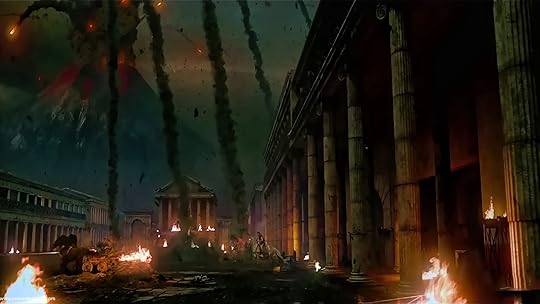
I liked Milo’s (Harrington’s) backstory and wished we could’ve seen more of Cassia’s. But we went into this knowing this movie was going to be more about CGI-special effects than it was going to be about character development.
Some of the gladiator scenes were laughable and downright cheesy. And pretty as he was, Harrington was a bit hard to believe as a gladiatorial champion. Fellow fighter-slave Atticus, played by Adewale Akkinnuove-Agbaje, had the gravitasand force of personality to pull it off. Indeed, he just about stole every scene he appeared in, making Milo seem even less believable as a serious contender.
As for the volcano scenes, all I can about say about them is that they are about what you’d expect—interesting to look at but not necessarily surprising, moving or awe-inspiring. There’s no evidence, either, that a tsunami occurred during the eruption (despite Pliny’s mention of the waters receding), so it felt a bit as if the director was throwing every possible form of death and destruction at us in a desperate attempt to keep our interest. Fire, lava, smoke, explosions, floods, ash storms, fiery flying boulders, collapsing buildings, giant sinkholes, tsunamis that crumbled entire coastlines…did I miss anything?
In the end, I enjoyed it and so, it seemed, did everyone around me.
I was already well into writing my novel when I learned about the making of Pompeii. For me, it was interesting to analyze the creative choices that we both made—and the many ways, thankfully, that we went in different directions. Still, it’s a movie about Pompeii, which was enough to pull me into the theater. That and Kit Harrington’s abs, I suspect, will be the draw for most.
My novel, Curses and Smoke: A Novel of Pompeii (Arthur A. Levine Books/Scholastic), releases May 27. You can pre-order your copy at your local independent bookstore, Amazon, or B&N.
Published on February 20, 2014 12:56
February 13, 2014
Whoa. This Guy Looks like he Stepped Right out of an Ancient Egyptian Carving.
Published on February 13, 2014 11:47
February 12, 2014
How Did I NOT Know This About the Name, Cleopatra?
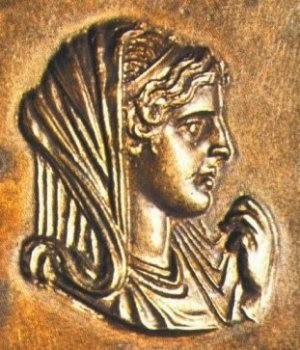 Olympias, mom of Alexander and his sister, Cleo the unknown.One of the earliest Cleopatras that I learned about was Alexander the Great's little sister.
Olympias, mom of Alexander and his sister, Cleo the unknown.One of the earliest Cleopatras that I learned about was Alexander the Great's little sister. What, I wondered, was Cleopatra of Macedon like? What if she was even smarter and more wily than Alex? What kind of life did she lead? How did she feel about her older brother getting to conquer the world while she was traded off to marry her own mother's older brother when she was a young teen?(Hmmm, maybe there's a book in there somewhere....).
Sadly, we'll never know anything about her because, well, she was a girl, which meant no one bothered to record her life.
When the Ptolemies took over Egypt, they connected their blood line to Alexander's for political legitimacy. So, many royal women were named after Alex's little sister. Our famous last queen of Egypt was the seventh Cleopatra in the Ptolemy line and her daughter, Selene, was the eighth.
 Snow happens, even in Athens. Here in Atlanta, it's more of an apocalypse.
Snow happens, even in Athens. Here in Atlanta, it's more of an apocalypse. So imagine my surprise when I discovered that there was an even "older" Cleopatra in Greek history. Khione, the goddess of snow, had a sister named...Cleopatra! I learned this only because snow is a big deal right now in the South. Here in Atlanta, the entire city is on lockdown because of ice and sleet. Which got me wondering what the ancients thought about snow. When I searched for ancient Greek snow gods, up popped Khione and her sister, Cleopatra.
Well, knock me over with an olive leaf.
Cleopatra was the daughter of Boreas, the god of the north wind, and Oreithyia, a mountain nymph. Some sources say she is a goddess of twilight, sometimes known as Alcyone.
Would knowing this little factoid have changed anything in my novel, Cleopatra's Moon, or my biography of the queen, Cleopatra Rules? No. I can't think of any way I could've worked that in without making it weird.
But still. Thanks to the snow and ice trapping me in my house, I learned something new about the name of two of my favorite queens in history. I'll try to remember that when I get cabin fever.
Published on February 12, 2014 07:41
February 7, 2014
Friday Funnies--Ancient Style!
Published on February 07, 2014 07:42
February 6, 2014
I'm Getting a Sneak Peek at Pompeii!

Miracle worker and photographer Vania Stoyanova of VLC productions got me passes to the screening of POMPEII!
That's right, I'm getting a sneak preview. Tonight. Here's the thing, though. There are no reviews anywhere (even on Rotten Tomatoes), which does not bode well. If movie marketers are worried that the movie is a dud, they often keep reviewers away from it for as long as possible. With the movie coming out in only a matter of weeks, it's kind of odd that there has been not a peep about it. I'm sincerely hoping that it's not a dud because...ancient Rome! Gladiators! Pompeii! Volcanoes! Kit Harrington's abs! My novel!
Not like I'm excited or anything. Thank you Vania! You rock.
Published on February 06, 2014 12:55


